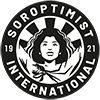Two Kenilworth Soroptimists travelled to New York on 8th March, (International Women’s day) to participate in the development of global policy to promote gender equality and the empowerment of women. They joined 6000 delegates from across the world attending the annual Commission on the Status of Women this year.
Soroptimist International holds General Consultative status with the Economic and Social Council (ECOSOC) at the United Nations. As members of the Soroptimists, women in Kenilworth are part of a huge International network. They have a voice as members of a Non Governmental Organisation (NGO), which can influence governments around the world to take action and improve the lives of women and girls.
Soroptimist International is one of the NGOs who contribute to discussions at the Commission on the Status of Women at the United Nations every year, where recommendations inform the thinking of Governments around the world. The recommendations, or ‘Agreed Conclusions’, provide a framework for Governments formulating policy and shaping strategies around a wide range of gender-based issues.
The framework also provides a mechanism for Governments worldwide to be held to account for their action on gender equality, and the advancement and empowerment of women. Soroptimist International was lobbying this year for further statistics from Governments, to improve the evaluation of individual government performance.
Ann and Andrea participated in events, debates and lobbying activities for the priority themes of the event. These included a review of the access and participation of women and girls to education and training, science and technology and the challenges and achievements in the implementation of the Millennium Development Goals for women and girls.
“We have over 20 years’ experience as Soroptimists between us and have raised funds, lobbied and participated in service projects locally, nationally and internationally to improve the lives of women and girls. Now we have been to the UN and seen for ourselves how our work influences government action around the world and understand more about the importance of feeding back our experiences at the local, grassroots level to help achieve the aims of our organisation. “

